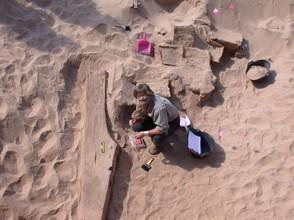CCU archaeologist receives grant to conserve ancient Eqyptian artifacts
Coastal Carolina University professor Cheryl Ward has received a $25,000 grant from the Antiquities Endowment Fund (AEF) of the American Research Center in Egypt for a project to document and conserve the remains of a 4,000-year-old Egyptian ship.
Ward, director of CCU's Center for Archaeology and Anthropology, plans to travel later this year to Mersa/Wadi Gawasi, the site of an ancient Red Sea harbor on the coast of Egypt where planks and equipment from the world's oldest seagoing vessels have been uncovered.
Easton Selby, assistant professor of visual arts at Coastal Carolina University, will also visit the site in order to photograph the artifacts as part of the documentation part of the project.
The artifacts, which include wooden planks and the largest amount of ancient rope ever discovered (with the original knots intact), are in serious danger of fungal decay after being removed from the sand that has acted as a protective covering for thousands of years, according to Ward.
This project is particularly significant, says Ward, because of the extreme antiquity of the artifacts and the urgent need to conserve them before they suffer any further deterioration.
Ward is a specialist in the archaeological study of ancient shipping. Last year she led a team of 24 scientists, shipwrights and sailors in the construction of a full-scale replica of a 3,800-year-old Egyptian ship, the Min of the Desert.
The story of the Min and the 18-day voyage on the Red Sea were the subject of an episode of PBS's science show "Nova" earlier this year.
Ward joined the Coastal Carolina University faculty in 2009 and was instrumental in developing CCU's archaeology and anthropology programs.
- Log in to post comments
 Printer-friendly version
Printer-friendly version- Send by email

